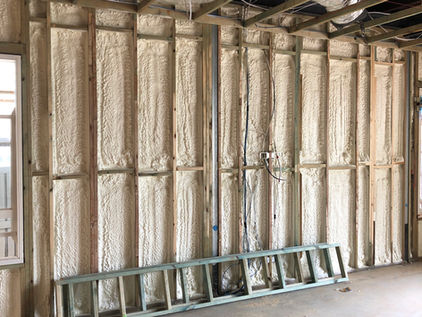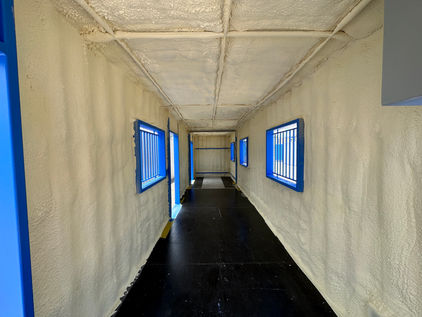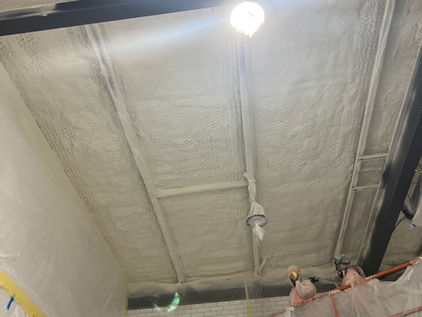
Is Spray Foam Insulation Fire Rated to Australian Standards?
Is Spray Foam Insulation fire rated?
One of the most common questions from those considering spray foam insulation for their residential or commercial projects is about its fire safety. The answer is clear: yes, spray foam insulation is fire rated to Australian standards and tested under AS1530.3. This of course varies and is dependant on the product being specified. Some products have been further tested unter AS3837 to get a designated group rating.
Understanding Spray Foam Insulation
Spray foam products vary in chemical compositions, with most containing fire retardants. However, their effectiveness can differ significantly. Among the top-performing foams in Australia, in terms of fire safety, is a closed-cell '2 pound' foam infused with a fire retardant, tested to AS1530.3, with AS/NZS 3837 group classification of 2 or 3
Non-Technical Description of Fire Performance
Sometimes, fire rated spray foam has been described as combustible but self-extinguishing. What this has been interpreted by some, is that when the source of flame is removed, the foam continuation of burning is significantly reduced and the spread of flame ceases.
What is the AS1530.3 Test?
The AS1530.3 standard involves methods for fire tests on building materials, components, and structures. It specifically measures:
-
Ignitability
-
Flame propagation
-
Heat release
-
Smoke release
Detailed Test Results
An example of a commonly used fire rated spray foams used in Australia, the fire performance test results are as follows:
-
Ignition Time: 4.28 minutes
-
Flame Propagation Time: Nil seconds
-
Heat Release Integral: 47.8 kJ/m²
-
Smoke Release: Log d -0.6222, Optical density 0.2582 / meter
-
Regulatory Indices:
-
Ignitability Index: 16 (Range 0-20)
-
Spread of Flame Index: 0 (Range 0-10)
-
Heat Evolved Index: 1 (Range 0-10)
-
Smoke Developed Index: 5 (Range 0-10)
-
Please note that different products and batches will have different results, and the above is an example
guide only. The product results are typically displayed on the products data sheets.

What Do These Results Mean?
These indices demonstrate that the foam has ignitability but does not significantly contribute to flame spread or heat evolution during a fire. The minimal smoke developed index also indicates lower risks associated with smoke production according to the measurement index.
When considering insulation options, the fire safety of spray foam is a significant factor. With its 'low spread of flame' properties and performance tested to Australian Standards, it represents a reliable choice for builders and architects aiming to enhance safety without compromising on insulation quality.
Understanding the Technical Testing for AS/NZS 3837 Group Classification
The Group classification in Australian fire safety standards pertains to the material's behavior in reaction to fire, including aspects like flame spread, smoke production, and overall combustibility. Materials classified with a Group rating 1-4 ratings are considered to have a demonstrated low, moderate to high contribution to fire growth, making them classifiable under the NCC/BCA for many building applications.
Testing Procedures Leading to Group Classification.
The classification of some spray foam insulation products into Group classifications involves a series of rigorous tests, primarily focusing on:
-
Ignitability: How easily the material can catch fire upon exposure to a flame or heat source.
-
Flame Propagation: This test measures the ability of the flame to spread over the surface of the material.
-
Heat Release: This test assesses the amount of heat released during the burning process.
-
Smoke Developed: The production of smoke is a critical safety consideration, as smoke can significantly hinder evacuation efforts and trigger smoke alarms.
Why Group Classification Matters
The significance of a Group classification for building materials like spray foam insulation lies in its compliance with safety regulations and the BCA & NCC, making it a viable option for use when compliant in living spaces, offices, and areas where people gather. These classifications ensures that the material meets specific safety standards that minimize the potential for fire-related incidents and align with the appropriate building codes, that aim to protect life and property.
Regulatory Impact of Group rated Materials.
Using Group rated materials can affect building design and insurance policies. For architects and builders, choosing a Group classified insulation is a step towards adhering to fire safety norms without compromising on the thermal efficiency and structural integrity of the building.
Conclusion
The technical testing of some spray foam products like the ones we use, leading to a Group classifications, underscores their suitability in applications where moderate fire resistance is sufficient. Understanding these tests and what the classification signifies helps professionals make informed decisions about the materials they choose, ensuring both compliance with safety standards and the well-being of building occupants.
Important Disclaimer: The above content is for general informational purposes only and is not professional advice. Before using spray foam insulation it is important to make informed decisions, which is why it is important to obtain the particular product's data sheet and technical information. We recommend consulting with registered builders, certifiers, and licensed professionals who can address specific needs and compliance for your project to NCC and local regulations.


Our Services. Where you can use spray foam insulation.
Notable Projects. Where we have used spray foam.

Unique Project Solutions
We are not a one size fits all company. We look at the best options for any project.
Which is why we use insulation batts, cavity wall insulation, and other products depending on the project needs.
As part of the Energy Efficiency Group we are a National Australian company specialising in delivering world leading insulation products and services for any application.

#InsulationBatts
#InsulationRemoval



































































